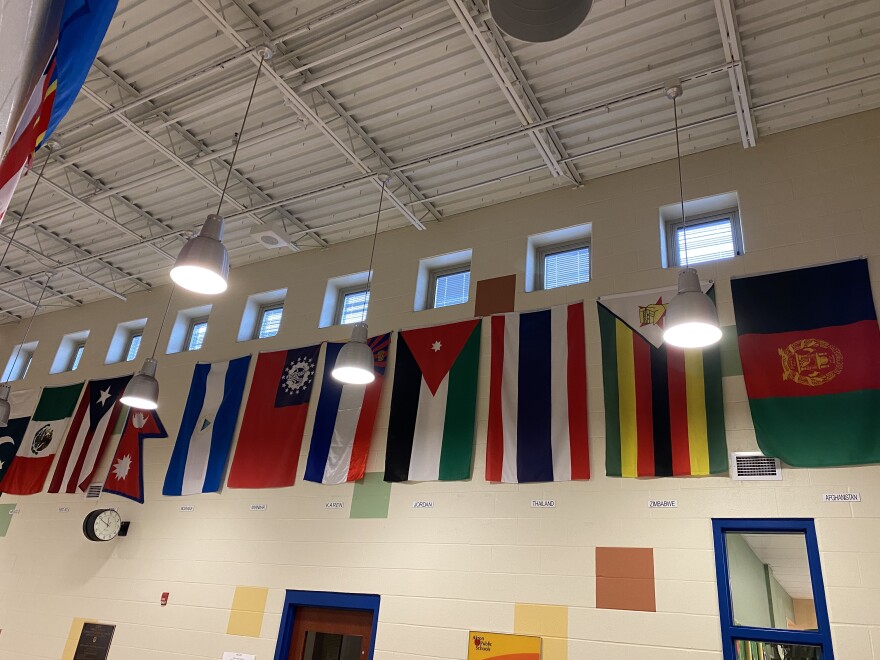The multilingual chatter of parents dropping off their kids at Akron’s Findley Community Learning Center fills the air. Only a few weeks ago, all of Akron Public Schools’ students had been online. The school doors are open once again, but for many immigrant students, the challenges remain.

Findley and neighboring North High School serve the North Hill area of Akron, a vibrant community of immigrants and refugees. Half of Findley and North High’s students are English learners. They come from 22 countries, and many have been hurt by months of remote learning.
Bearing the Brunt of Remote Learning
Findley’s Dean of Students Theresa Essandoh says for some immigrant children, their first day at school was sitting in front of a computer.

“Many of the students who are new to the country or who arrived in the country just before last March came from refugee camps and other places where they didn’t have access to technology, or they’ve never seen the inside of a school building,” Essandoh said.
Baby Sunar immigrated from Nepal to the Akron area in 2011. When school went online, she says her 7-year-old son felt lost. Trying to help him adapt to the technology was frustrating and brought both to tears.
“I was feeling like I was depressed because of my son,” she said.
Sunar, who’s immersed in Akron’s Nepali community, says early on, many students missed weeks of school assignments. And the state’s preliminary data shows English learners were among those hurt the most by the pandemic.
“Lots of kids have missed all of their assignments because some of the parents don’t speak English so how can they do this?” she asked.
Sunar is determined to make a difference and has signed up to serve as a parent-partner with the early childhood SPARK program, a free kindergarten readiness program that works with children and parents in their homes in about a dozen communities in Ohio.
COVID Interferes with Integration Programs and Activities
In Akron, the Nepali community has also restarted some homegrown religious, music and language programs that were shut down by the pandemic.
But for many, schools were the key integrator.
For Chitra Thulung, another Nepali immigrant, witnessing her son Pratik’s struggles to stay focused, his frustrations with the technology, and isolation from friends influenced her decision to send him back to school. Acclimation is one reason why.

Her son’s school friends have taught him American traditions, which he gladly shared with his parents.
“He likes the Christmas celebration and then Thanksgiving. He wants all of that so we celebrate that culture,” Thulung said.
During the shutdown, Findley’s Principal Sherry Bennington says virtual lunch periods were introduced to engage students.
“They talk about what they’re eating for lunch and that they have something that’s very specific to their family or culture. So, there are ways of integrating, but it’s definitely at a smaller scale,” Bennington said.
Over at North High, Campus Principal Kim Sabetta says the school used to offer immigrant parents the opportunity to learn English through a volunteer program. That, too, was halted during the pandemic.
Sabetta says immigrant families understand the importance of education but distance learning hurt.
“You had students who maybe weren’t as engaged, or you had students who were working and not attending classes as frequently as they should have been,” Sabetta said.
Isolating Effects of the Pandemic and Support Efforts
Even with the struggles, some immigrant students continue to learn from home.
Veronica Gomez, who is originally from Nicaragua, has two boys at Findley who are learning remotely. It has felt like a full-time job for her, but the fear of contracting COVID has kept her from returning them to school. Speaking through an interpreter, she says the boys had limited interaction throughout the winter with other kids.
“They normally enjoy snow, but right now she doesn’t let them play in the snow because the other kids will see them, and they will want to come outside to play,” she said.
Even for those who returned to the classroom this spring, the struggles continue. In-person events have been curtailed, and there are daily challenges, such as masks making it harder to observe the lip movements that help the children learn a new language. Essandoh says extra support, including small-group sessions and more family check-ins, is especially crucial for families who arrived within a year of the pandemic striking.

“Those kids get extra time, extra support, extra preparation, extra guidance. And, if they detect that there needs to be more emotional or mental health support, then they refer them to the counselor,” Essandoh said.
She adds that those extras will have to extend beyond the pandemic.




